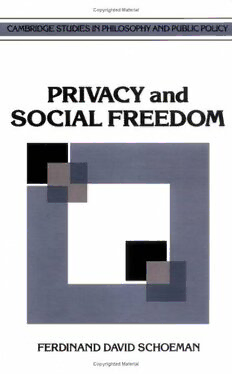
Privacy and Social Freedom PDF
239 Pages·1992·4.919 MB·English
Most books are stored in the elastic cloud where traffic is expensive. For this reason, we have a limit on daily download.
Preview Privacy and Social Freedom
Description:
This book attacks the assumption found in much moral philosophy that social control as such is an intellectually and morally destructive force. It replaces this view with a richer and deeper perspective on the nature of social character aimed at showing how social freedom cannot mean immunity from social pressure. The author demonstrates how our competence as rational and social agents depends on a constructive adaptation of social control mechanisms. Our facility at achieving our goals is enhanced, rather than undermined, by social control. The author then articulates sources, contracts, and degrees of legitimate social control in different social and historical settings. Drawing on a wide range of material in moral and political philosophy, law, cognitive and social psychology, anthropology, and literature, Professor Schoeman shows how the aim of moral philosophy ought to be to understand our social character, not to establish fortifications against it in the name of rationality and autonomy.
See more
The list of books you might like
Most books are stored in the elastic cloud where traffic is expensive. For this reason, we have a limit on daily download.
